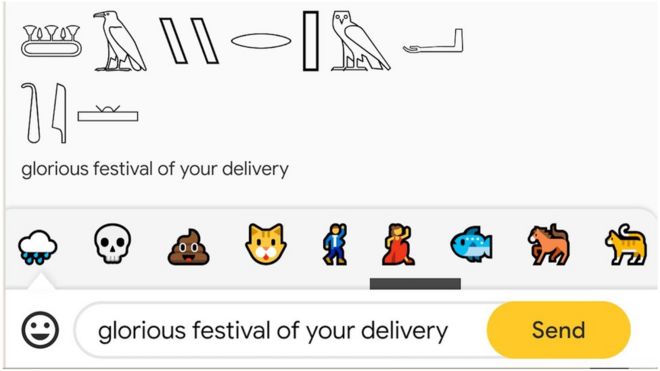Google launches hieroglyphics translator powered by AI
- 15 July 2020

Google has launched a hieroglyphics translator that uses machine learning to decode ancient Egyptian language.
The feature has been added to its Arts & Culture app. It also allows users to translate their own words and emojis into shareable hieroglyphs.
Google says Fabricius is the first such tool to be trained via machine learning "to make sense of what a hieroglyph is".
In theory, it should improve over time as more people use it.
'Grand claims'
A desktop version of Fabricius is also being offered to professional Egyptologists, anthropologists and historians, to support their research.
One expert welcomed the initiative but said its "grand claims" needed to be viewed in context.
"While impressive, it is not yet at the point where it replaces the need for a highly trained expert in reading ancient inscriptions," said Dr Roland Enmarch, a senior lecturer in Egyptology, at the University of Liverpool.
"There remain some very big obstacles to reading hieroglyphs, because they are handcrafted and vary enormously over time in level of pictorial detail and between individual carvers/painters.
"Still, this is a step on the road."
Decipher findings
The software's Workbench tool allows the user to upload photos of real hieroglyphs found on artefacts and digitally enhance the images to better analyse the symbols.
Users can trace the outlines of hieroglyphics, which the software then tries to match up with similar symbols in its database - allowing them to search for different meanings and attempt to decipher findings.
The tool works by analysing historical records and definitions of the language.
But Google hopes it can build up a more extensive database as people add to the system.
Broken texts
Researchers can also annotate and retouch faded symbols in Workbench, which Google hopes will lead to new historical findings.
The tool was created in collaboration with the Australian Center for Egyptology, at Macquarie University, Psycle Interactive, Ubisoft and Egyptologists from around the world.
"Digitising textual material that was up until now only in handwritten books will completely revolutionise how Egyptologists do business," Dr Alex Woods, from the Australian Centre for Egyptology, said.
"Digitised and annotated texts could potentially help us to reconstruct broken texts on the walls and even to discover texts we didn't know were there."
The software's launch coincides with the anniversary of the discovery of the Rosetta stone, which first enabled experts to learn to read Egyptian hieroglyphs.
It is currently available in English and Arabic.
-- Sent from my Linux system.
No comments:
Post a Comment